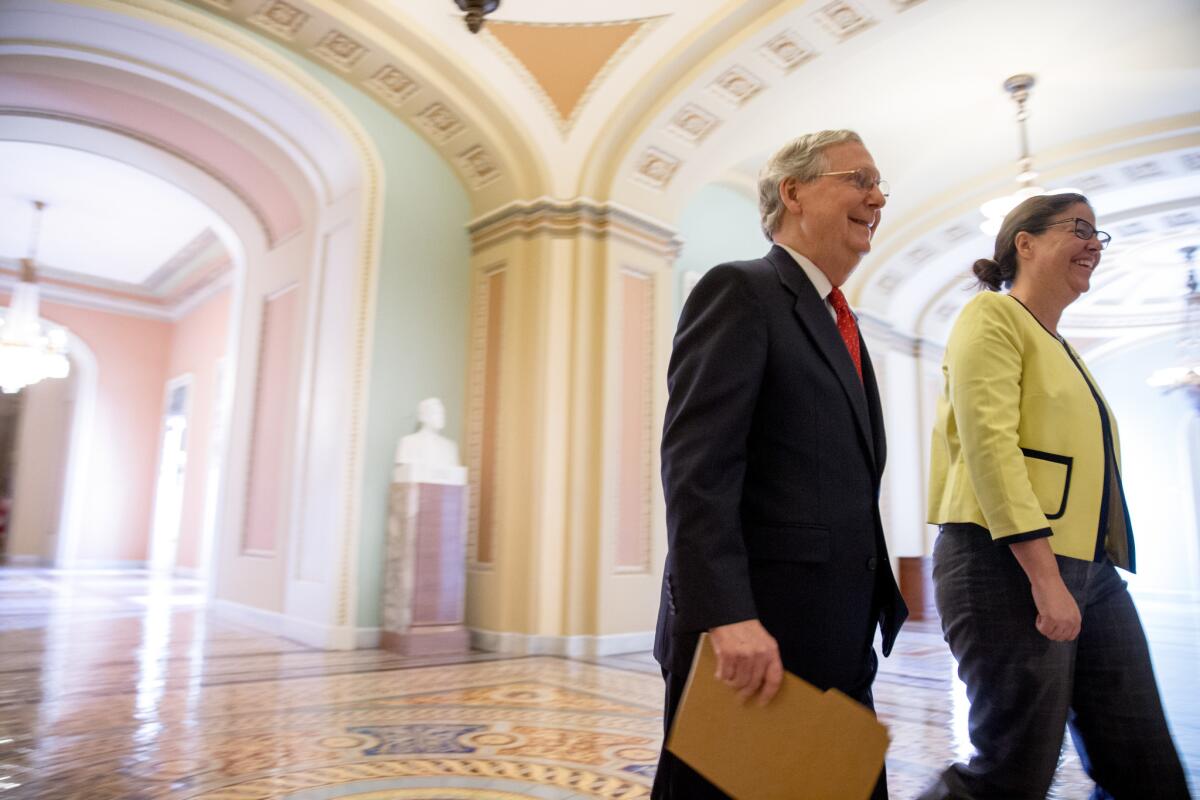Highway funds in jeopardy as House and Senate differ on way forward

Senate Majority Leader Mitch McConnell, left, accompanied by Secretary for the Majority of the Senate Laura Dove, heads into the Senate chamber for a Sunday session on Capitol Hill in Washington, July 26, 2015.
A congressional standoff over how to renew an expiring highway-funding bill pushed the Senate into a rare and heated Sunday session, but the legislative path forward remains unclear, leaving federal transportation projects hanging in the balance.
Adding to the complication were votes Sunday on several unrelated amendments to the Senate highway bill. One to repeal Obamacare was rejected and another to resuscitate the Export-Import Bank advanced toward approval.
But the fate of the six-year, $337-billion Senate bill, which could face a final vote later this week, remained in doubt since it is starkly different from a stopgap House bill passed earlier this month, which would extend transportation funding for another five months while a broader compromise is crafted.
The stalemate over authorization for the nation’s highway program, which expires July 31, is not so much a traditional partisan divide, but rather a tussle between the House and Senate. Both chambers are controlled by Republicans, but they’ve taken different approaches to the problem.
Transportation Secretary Anthony Foxx warned that billions of dollars in transportation projects and thousands of jobs across the nation are at risk if a compromise is not reached. Only days remain before House lawmakers leave for the summer recess, and money runs out at the end of the month.
“This country is hungering for robust transportation,” Foxx said Friday. “The problems of congestion that have gotten worse over the last several years -- the potholes in the roads, the bridges that need to be repaired --I could go on and on.”
“I’ve just been to so many places around the country where traffic is getting worse,” he said. “People are beginning to draw the line, follow the bread crumbs back to Washington.”
Transportation funding problems have been building for years, partly because the 18-cents-a gallon federal gas tax has remained flat while vehicle fuel efficiency has increased, leading to repeated shortfalls in the highway account.
Congress has repeatedly patched the highway trust fund, but has been unable to agree on a new revenue stream to cover the costs of repairing and upgrading the nation’s aging infrastructure.
Senators have devised a far-reaching bill that would revamp transportation policy over the next six years, and provide funding for road, freight and public transit projects for half that time.
But the bipartisan Senate plan, championed by Sen. Barbara Boxer of California, the top Democrat on the committee, and Republican Sen. James Inhofe of Oklahoma, the chairman, is paid for by revenue cobbled from various federal sources.
The House dismisses this approach, and approved its own stopgap bill that replenishes the highway fund through December -- a temporary fix while a bipartisan group led by Rep. Paul Ryan (R-Wis.) works on a longer-term solution.
Ryan, with backing from a key Democrat, Sen. Charles E. Schumer of New York, wants to overhaul the international tax code, and use taxes generated on overseas corporate profits for the highway fund.
“The House has passed a responsible bill,” said Speaker John A. Boehner (R-Ohio), adding his members have “a lot of concern” about the Senate legislation.
The House’s approach, though, faces uncertain odds because the politics of rewriting tax policy is complicated. It is also one rejected by Senate Majority Leader Mitch McConnell (R-Ky.), who prefers a broader review of the entire corporate tax code.
On Sunday, the consideration of the transportation bill was complicated further by McConnell’s decision to tack on an unrelated measure resurrecting the Export-Import Bank onto the legislation.
The leader had bucked his conservative flank led by Sen. Ted Cruz (R-Texas) and promised a vote on the 81-year-old institution, which provides financing for foreign buyers of U.S. exports but has been unable to make new loans since Congress allowed its authority to lapse last month.
Conservatives backed by powerful groups aligned with the billionaire Koch brothers oppose the Export-Import Bank as an example of corporate welfare, but it is supported by business leaders including the U.S. Chamber of Commerce. President Obama and most Democrats also back the bank.
On Sunday, senators agreed 67-26 to advance an amendment to reauthorize the bank through 2019, virutally ensuring the amendment would be the Senate transportation bill.
Tempers flared Sunday as McConnell and his top lieutenants tried to publicly tamp down a conservative rebellion over the bank amid calls for civility among senators, but Cruz doubled down on his earlier assertion that McConnell had essentially told “a lie” by allowing the vote.
In a pointed speech Friday, Cruz, who is running for president, blasted McConnell for allowing the Ex-Im bank amendment but blocking other amendments that Cruz and others wanted to offer.
In particular, Cruz was prevented from offering amendments that would stop Obama’s immigration actions and halt the emerging nuclear deal with Iran unless Tehran frees U.S. hostages and recognizes Israel.
Cruz had publicly accused McConnell of telling “a lie” when McConnell denied earlier this year that he had agreed to give Ex-Im bank supporters another chance to resuscitate the bank by attaching an amendment to must-pass legislation like the highway bill. Cruz said Sunday’s vote was proof of such a secret deal.
“Speaking the truth about actions is entirely consistent with civility,” Cruz said Sunday, quoting novelist George Orwell, “In a time of universal deceit, telling the truth is a revolutionary act.”
The maneuver may not succeed in saving the bank since presumably now House and Senate leaders will need to negotiate some sort of compromise highway bill that may not include the Ex-Im amendment.
For the latest from Congress and 2016 campaigns follow @LisaMascaro
More to Read
Sign up for Essential California
The most important California stories and recommendations in your inbox every morning.
You may occasionally receive promotional content from the Los Angeles Times.











